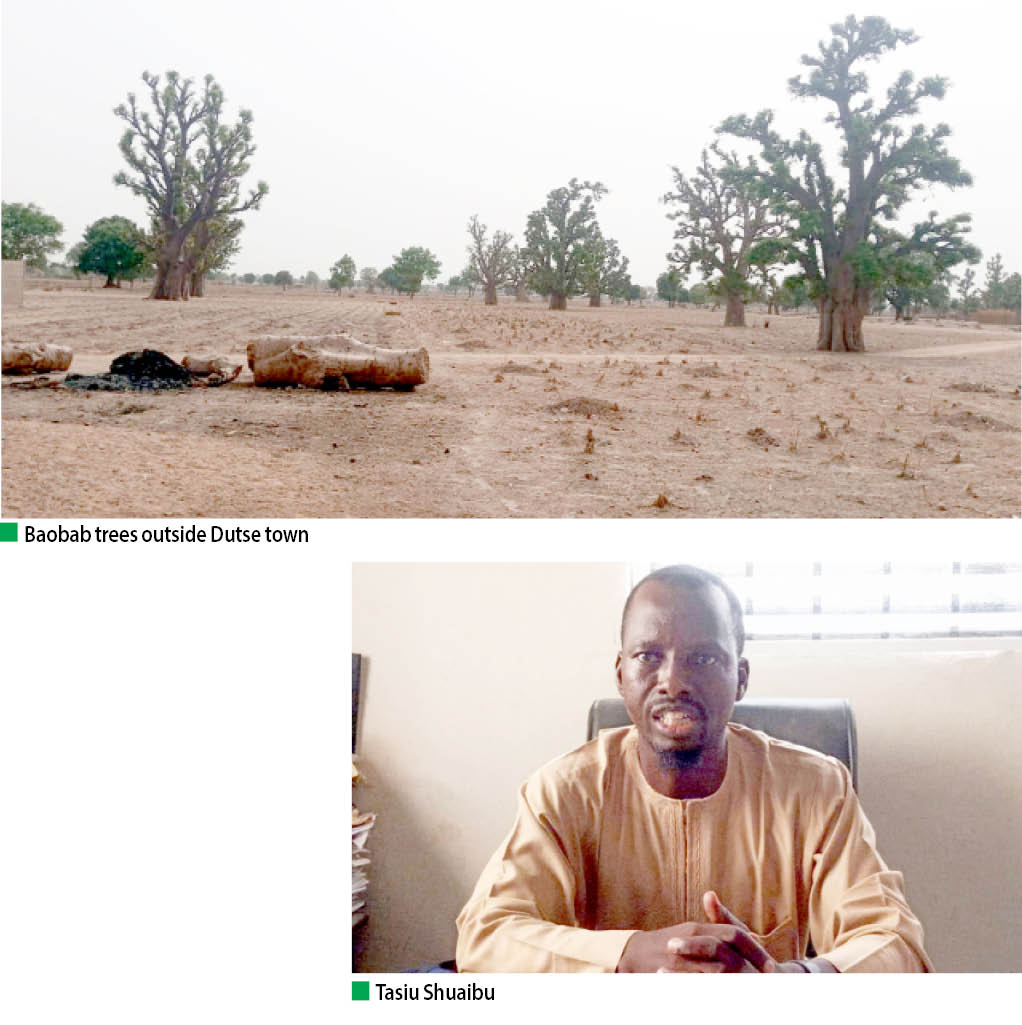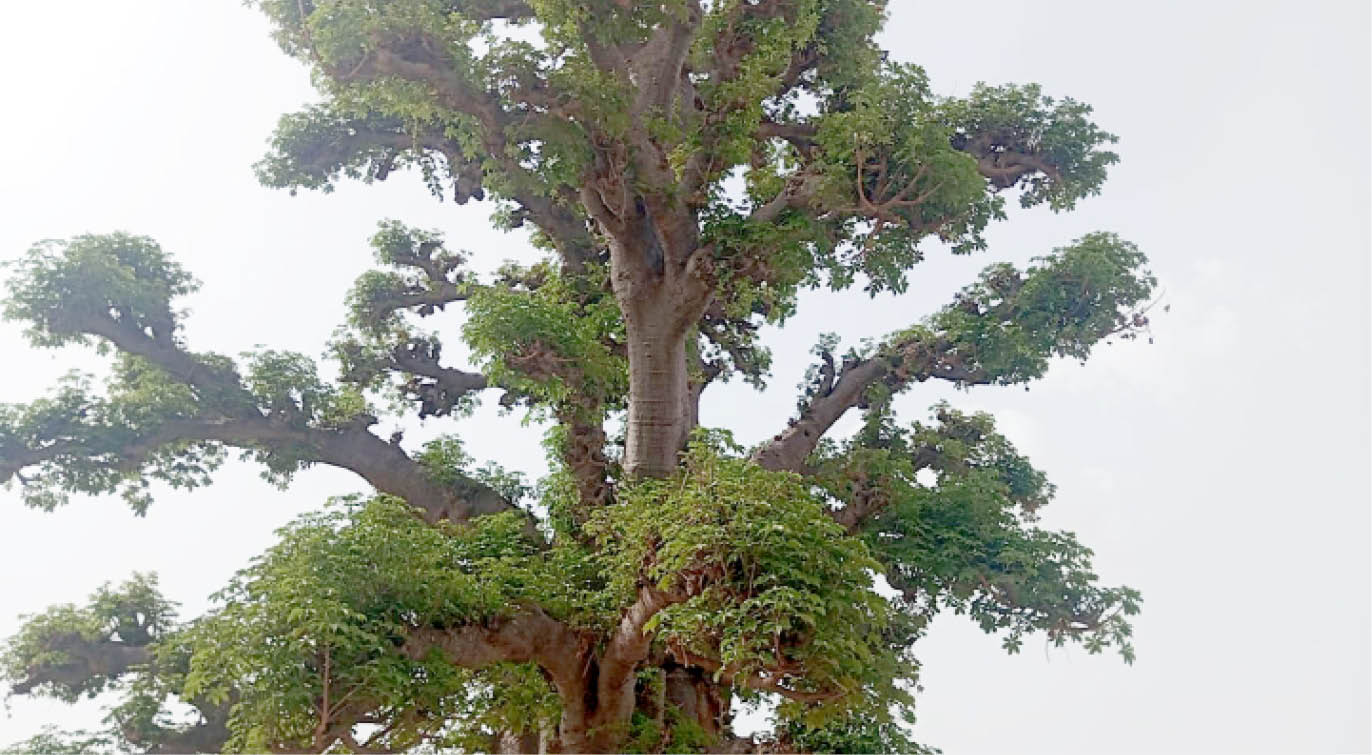The baobab tree (Adansonia digitata) is an iconic and ancient tree specie native to Africa, Australia, and the Indian Ocean. It’s known for its unique massive trunk, which can store up to 32,000 gallons of water, allowing it to survive in dry environments and withstand drought.
Earliest written reports about the tree were from the 14th century travelogue by the famous Arab traveller Ibn Battuta according to Wikipedia.
Some of the fascinating facts about the Baobab tree include that its lifespan can be up 1,000 years or more, its trunk diameter may be up to 36 feet (11 meters) while its height can be up to 100 feet (30 meters). Its branches can look like a root system, making the tree so unique that it is called the upside-down tree. Baobab leaves are edible and rich in vitamins and minerals. It produces fruits that are nutritious and rich in vitamin C and calcium.
Researchers said the cultural significance of the tree is considered sacred in many African cultures because it is often used as a meeting place, shelter, and source of food and water.
- Insight into the life of Aminu Dantata as a family man, sportsman and silent Philanthropist
- Unbridled creativity unleashed at the STORIES
The baobab tree can thrive in a variety of environments, from dry savannas to tropical forests. The tree sheds its leaves during the dry season, an important indicator to its resilience and adaptability.
The baobab tree is an incredible natural wonder, providing numerous benefits to both humans and wildlife.
Its impressive size, unique shape, and remarkable adaptations make it a beloved and iconic symbol of the African savanna.
The baobab tree, a symbol of resilience and vitality in Northern Nigeria, is facing a decline due to various factors.

Among trees identified by researchers as endangered tree species in Jigawa State are baobab (Adansonia digitata) and tamarindus indica.
This was contained in an assessment of endangered economic tree species and conservation techniques in the state conducted in 2022 by Africa Journal Online and the International Centre for Underutilised Crop.
The assessment observed that baobab tree is among most commonly exploited and used as firewood, mortar, pestle or medicinal purpose.
Other reasons for its decline include Climate Change. Rising temperatures and changing rainfall patterns affect the tree’s ability to store water, making it vulnerable to drought and reduced growth.
Over-harvesting or excessive harvesting of its fruit, leaves, and bark for food, medicine, and other purposes has put pressure on its population.
Deforestation and Land Degradation: Widespread deforestation and land degradation due to agricultural expansion, urbanization, and livestock grazing have led to habitat loss and fragmentation.
Pests and Diseases: The baobab tree is susceptible to pests like the African baobab fruit fly and diseases such as fungal infections, which can weaken its immune system.
Human Activities: Construction, road development, and mining activities have resulted in tree destruction and habitat disruption.
Lack of Conservation Efforts: Inadequate protection and conservation measures have allowed the decline to continue unchecked.
Aging Tree Population: Many Baobab Trees in Northern Nigeria are centuries old, and natural aging processes, combined with environmental stressors, contribute to their decline.
Soil Degradation: Soil erosion and nutrient depletion due to unsustainable agricultural practices and overgrazing have reduced the tree’s ability to absorb essential nutrients.
Urbanization and Infrastructure Development: Expanding cities and infrastructure projects often lead to tree removal and habitat destruction.
Limited Regeneration: Baobab trees have a low regeneration rate, making it challenging for the population to recover from decline.
The decline of the Baobab tree in Northern Nigeria has significant ecological, cultural, and economic implications, highlighting the need for conservation efforts and sustainable management practices to protect this iconic species.
Tasiu Shuaibu (Al-Gwarami), a lecturer at the Department of Animal and Environmental Biology, Federal University Dutse, said the baobab tree has a long history of existence. Its natural habitat is in Africa including Nigeria, it’s in abundance in the savannah region of northern Nigeria. It’s known by a scientific name Adansonia digitata. It can grow up to 98 feet and 30 meters tall.
The lecturer said the baobab is rich in vitamins and minerals such as vitamin c. It is nutritious when consumed as foods such as baobab soup, and the back/stem is used for making rope for farming animals.
According to him, the conservation status of baobab indicates that they are almost becoming endangered due to their declining nature in most parts of northern Nigeria.
He called on the government and non governmental organizations to partner with botanists and entomologists to come up with an eco-friendly bio pesticide particularly from baobab leaves to reduce damage caused by insect pest.
According to him, using chemicals these days is causing health hazard to humans and their livestock.
Malam Sa’ad Saleh Korau, a family man in Korau community of Kiyawa LGA of Jigawa State, said Hausas use the dried leaves of baobab to make a delicious soup (Miyar Kuka) while its fruit is used for artificial milk (Kwalba da Nono). Also, its bark is used to make rope.
Unfortunately, he said, “the tree is gradually declining due to rapid urbanization and projects all over the state,” calling on the state government to take urgent measures.
Another resident Malam Biyu Dahiru from Garkon Alli village, said the baobab leave has been in use for centuries in northern Nigeria.
He advised the government to establish factories that would process the products of the baobab tree.

 Join Daily Trust WhatsApp Community For Quick Access To News and Happenings Around You.
Join Daily Trust WhatsApp Community For Quick Access To News and Happenings Around You.



